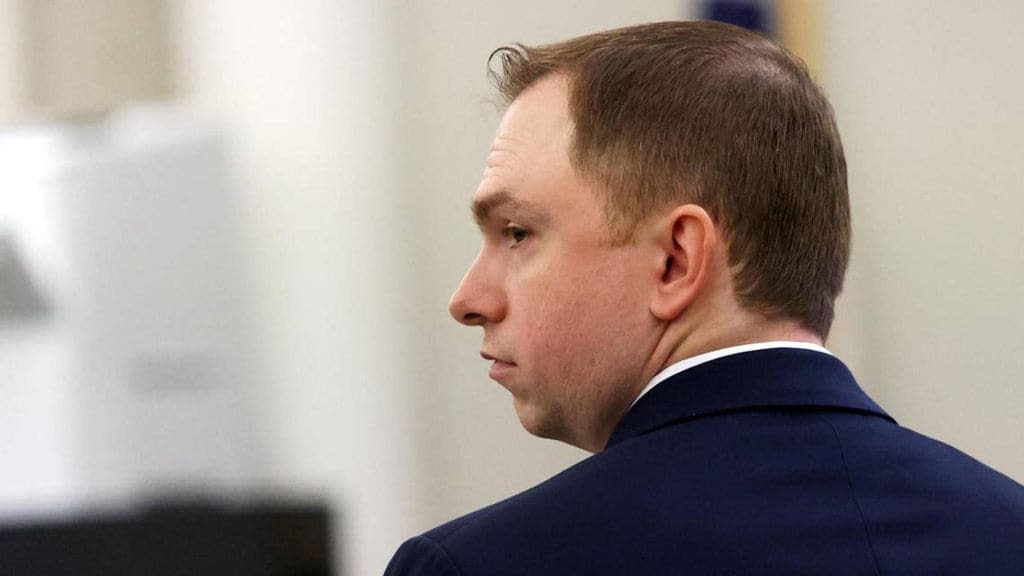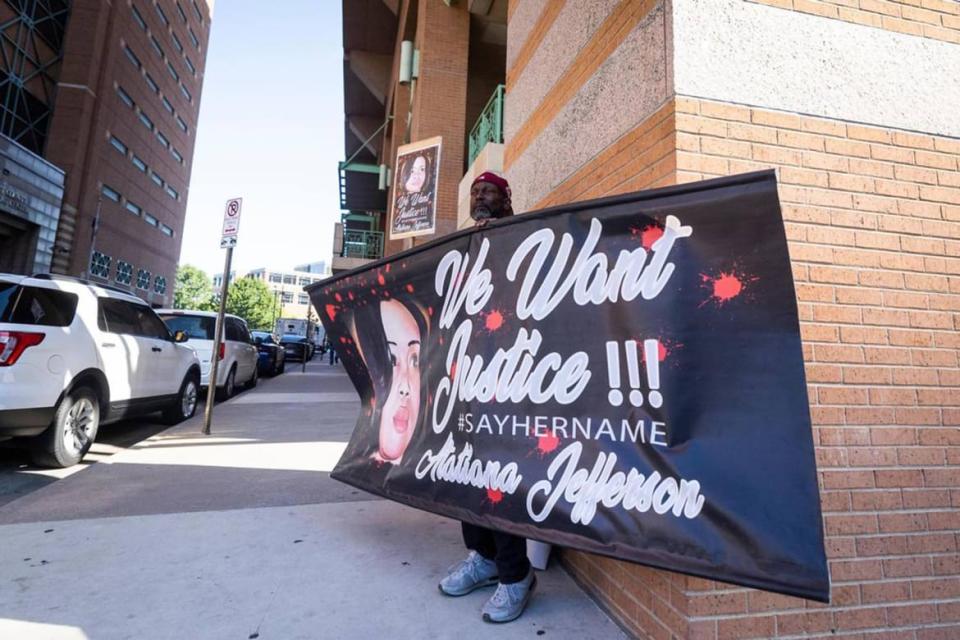Cop Who Killed Atatiana Jefferson Recounts Moment He Pulled the Trigger

The former cop who fatally shot Atatiana Jefferson three years ago testified Monday that he saw her point a gun “directly” at him during a welfare check that went awry at Texas home—contradicting evidence from Jefferson’s young nephew.
But, when asked to grade his police work that night, Aaron Dean conceded on the witness stand Monday, “There are probably things I could have done better.”
It’s the first time Dean, who is white, has spoken publicly about the death of Jefferson, a 28-year-old Black woman who he’s charged with murdering.
Dean fought back tears and sniffled throughout his testimony Monday, repeatedly insisting that he believed Jefferson’s Fort Worth home was being robbed when he was called to conduct a welfare check the night of Oct. 12, 2019. A jury must decide whether Dean was justified to use deadly force out of fear for his own life when he shot Jefferson.

Along with another Fort Worth officer, Dean was sent to Jefferson’s home after a neighbor spotted a door left open and called a non-emergency police line as it was out of the ordinary—information that Dean said was relayed to him.
Dean, who was fired and arrested for murder in 2019, recited his version of events to the jury on Monday. At first, he investigated the wrong address. Dean said that he and another cop then parked away from Jefferson’s home to conceal that they were there. He recalled quietly walking through Jefferson’s yard while using a flashlight to peek through windows and open doors.
Dean said the home appeared to have been “ransacked,” so he proceeded as if a robbery was in progress and turned on his body camera. He said he spotted a screwdriver—possibly used to break into the house—and a kitchen that had all of its drawers and cabinets open.
Dean Murder Trial: VIDEO: Former police office Aaron Dean talks about thinking Atatiana Jefferson’s home looked ransacked - thought it was a burglary-in-progress. Would eventually encounter Jefferson, shoot and kill her. LIVE: https://t.co/kyxM92Bdad pic.twitter.com/iYwCoODAey
— Larry Collins (@LarryNBC5) December 12, 2022
“It looked like someone had gone through the cabinets and drawers looking for items to steal,” Dean said.
Whether Dean believed the house was being robbed or not is a central issue in the trial. Dean’s defense claims the death was a “tragic accident,” while prosecutors argue he intentionally murdered Jefferson, who had not committed a crime.
Jefferson’s nephew, 11-year-old Zion Carr, testified last week that he was playing video games with his aunt the night of the shooting. He said they left the doors and windows open after cooking hamburgers. He recounted his aunt grabbing a gun when she heard a noise in the backyard, and said the weapon was at her side when Dean killed her.
Prosecutors highlighted this in their opening statements, saying the incident’s only living witness, Zion, confirmed Jefferson never raised her handgun above her side.
“This is not a circumstance where they’re staring at the barrel of a gun and he had to defend himself against that person or to protect his partner,” Tarrant County prosecutor Ashlea Deener said. “The evidence will support, he did not see the gun in her hand. This is not a justification. This is not a self-defense case. This is murder.”
Dean’s testimony on Monday contradicted those claims.
He said he spotted a silhouette of a person through a bedroom window but couldn’t see their hands or determine if they were “black, white, male, female” because it was so dark. He claimed he saw movement that resembled an adult reaching for a gun.
“I thought we had a burglar, so I stepped back, straightened up and drew my weapon,” Dean said.
He said he yelled for the person to show him their hands, which his body camera captured just a second before he opened fire.
“I was shouting at this time, shouting commands, ‘Put up your hands, show me your hands, show me your hands,’” he said. “And as I started to get that second phrase out, ‘Show me your hands,’ I saw the silhouette, I was looking right down the barrel of a gun. And when I saw that barrel of that gun pointed at me, I fired a single shot from my duty weapon.”
Dean testified that he could see more than his body camera captured. After he shot Jefferson, he said he heard a scream and watched as a body collapsed to the ground along with a gun.
#AaronDean trial day 4: Dean becomes visibly emotional when talking about the moment he shot Atatiana Jefferson through the window. @CBSDFW pic.twitter.com/sJTO8ULxhZ
— Ken Molestina (@cbs11ken) December 12, 2022
“I just saw the silhouette of the person and the gun,” Dean said. “I don’t recall seeing hands but I saw that weapon pointed at me. The gun was pointed directly at me.”
Dean said he attempted to open a window to render aid but it was locked. He said he went through the open front door, still thinking that he was responding to a robbery in progress.
The home “looked like trash,” Dean said, as if a thief had gone through everything. Then, he spotted a boy, since identified as Zion, who was in the same room as Jefferson.
“I get to that back bedroom and off to my right I see a kid,” Dean said. “And I’m thinking ‘who brings a kid to a burglary, what is going on?’ I see a dog and at that point I’m just like…‘Shut up and work, shut up and work, get the weapon, render aid to her, get the weapon, render aid to the person.’”
Dean said he never actually performed first aid on Jefferson because he didn’t have a trauma kit, but he put on gloves and picked up her handgun. First responders were unable to revive her.
Body-camera footage of the incident sparked outrage across the country just months before 2020′s widespread social justice protests. Fort Worth Mayor Betsy Price called the killing “unthinkable” and even Greg Abbott, Texas’ gun-loving Republican governor, questioned Dean’s actions in a tweet.
The outrageous death of Atatiana Jefferson: What was Fort Worth cop possibly thinking when he shot?
That's the key question.https://t.co/xaGvR4kf3l— Greg Abbott (@GregAbbott_TX) October 14, 2019
Dean was heavily criticized by prosecutors in their opening statements for never announcing himself as a cop while circling Jefferson’s home—something prosecutors grilled him on during Monday’s questioning.
Dean responded that it was not part of Fort Worth police’s procedure when responding to calls about buildings being left open.
“It’s part of the general training,” Dean said. “We don’t announce ourselves in order to not alert bad guys.”
Asked to grade his police work that night, Dean conceded “there are probably things I could have done better.”
When pressed by prosecutors to grade his performance between an A and F, Dean paused for more than 10 seconds before responding: “Probably a B.”
Dean’s trial was delayed by a combination of attorney wrangling, the terminal illness of Dean’s former lead defense attorney—who died on the eve of jury selection—and the coronavirus pandemic.
None of the 12 jurors selected for Dean’s trial are Black, the Dallas Morning News reported. If convicted, Dean faces up to life in prison.
Get the Daily Beast's biggest scoops and scandals delivered right to your inbox. Sign up now.
Stay informed and gain unlimited access to the Daily Beast's unmatched reporting. Subscribe now.

